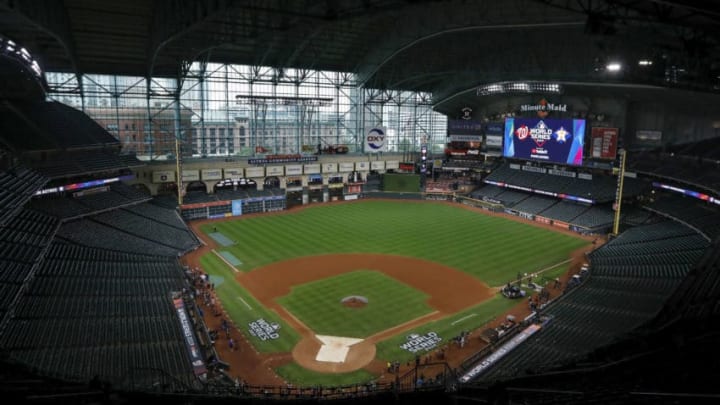Houston Astros’ fans, how would you feel about Minute Maid Park having a space museum to honor the team’s namesake? Hear me out on this case I’m making.
Regardless of when and where the Houston Astros’ 2020 baseball season might take place as the MLB players association and league officials struggle to reach an agreement, I believe the Houston Astros and the Harris County Houston Sports Authority need to undertake a special upgrade for Minute Maid Park. This upgrade represents a win-win as it could increase both the Astros’ and Minute Maid Park’s value, as well as spur economic development for the city of Houston.
No, don’t worry, I’m not about to preach about bringing back Tal’s Hill. Although, touchless soap dispensers and water faucets like those that Citi Field in Queens boasts even in the upper deck near the stadium’s cheapest seats would be a great addition to all of Minute Maid Park’s bathrooms.
But what I really wanted to write about today is that Minute Maid Park, as beautiful as it is, has a huge opportunity to do something truly unique and special, primarily because of the meaning of the Astros‘ name. Specifically, as someone with previous experience working in education, I want to stress how important science, technology, engineering, and math (STEM) learning objectives are for all youth, regardless of age from early childhood onward. Even adults benefit from life-long learning. Therefore, I would like to share a vision for an on-site Minute Maid Park science museum.
Hear me out, you get to the game early, or maybe your casual baseball fan guests do not much care for taking in all nine innings, so imagine a designated area displaying authentic spacesuits, rover replicas, and the like on loan from NASA in clear glass cases with educational captions. Imagine touchable moon and asteroid samples nestled near a hand sanitizing station.
But that’s not all. A Minute Maid Park science museum experience could feature a fan interactive connection to physics as well. For instance, people might ask—why does a particular batter who has a smaller body seem to hit the ball even further than another hitter with a larger body? Or why do smaller pitchers sometimes throw fastballs harder than larger ones? This presents a great opportunity for a baseball-related interactive exhibit which demonstrates Newton’s second law of motion, force equals mass multiplied by acceleration.
Additionally, fans could also learn about the effects of various causes of friction on a moving baseball. For example, why do pitches decelerate in velocity before reaching home plate, or even why do fly balls always run out of steam instead of traveling forever in one direction within Earth’s atmosphere? This provides an avenue for an interactive exhibit illustrating Newton’s first law of motion that explains how baseballs fight not only gravity but atmospheric conditions until they come to a complete rest.
And regarding Newton’s third law of motion, for every action there is an equal and opposite reaction, an interactive exhibit opportunity presents itself to elaborate upon how a bat in motion receives and redistributes the energy of a pitched ball through the coefficient of restitution.
But more than just having a museum area dedicated to space and sports science, the Houston Astros need to own their name.
So, what is an Astro, anyway?
Okay—I’ll be clearer. But first, let me ask you—what precisely is an Astro? Don’t worry, there is no shame in not exactly knowing.
Though initially embarrassing for myself as a native Houstonian to admit, I never really knew exactly what an Astro was until college. It hit me all of a sudden.
The year was—well, that’s not important, and I was researching a business case study in which a hotel owner in Florida referred to some of his NASA customers who went to space and lodged at his property as “Astros.” For me, it was an aha moment for the ages.
On that day, I learned from that hotel owner, astro, was simply an abbreviation for astronaut. Confusing matters, a look at Merriam-Webster Online Dictionary shows a vague and broadly encompassing explanation for the term: “star : heavens : outer space : astronomical.”
So, take solace. There is no shame in not knowing precisely what the Houston Astros are named after. I, for one, believe the moniker was intended as a nod directly referencing astronauts, as opposed to the stars, heavens, or space, in general.
But what does that say when even native Houstonians are not sure what Houston’s baseball team
More from House of Houston
- Are you the 2021 FanSided Sports Fan of the Year?
- Houston Texans: 4 reasons Romeo Crennel is right coach right now
- Astros-Twins Wild Card Series: 5 things to know as MLB postseason begins
- Houston Texans: The Most Underrated Sports Drought Ever
- Houston Texans: J.J. Watt’s early case for NFL Hall of Fame
name means? No, that was not meant to be rhetorical. Rather, it says that the Houston Astros need to do better at digging in and branding their identity.
After all, America loves space, as do the people of Houston. Record-setting online viewership of the SpaceX Falcon 9 reusable rocket that recently launched two U.S. astronauts into space only underscores the widespread enthusiasm and positive regard millions of people throughout the country have for astronauts. Could the Houston Astros be waiting in the wings to be crowned as America’s Team upon U.S. astronauts successfully landing on Mars?
While I cannot say, strengthening the Astros’ brand represents a concept I intend to address in detail in a follow-up article. But for now, how would you feel about a fan-accessible permanent space science exhibit area, perhaps located within Union Station or on the main concourse at Minute Maid Park?
For more information about COVID-19, visit the CDC’s Web site or the Web site for your state’s Department of Health.
